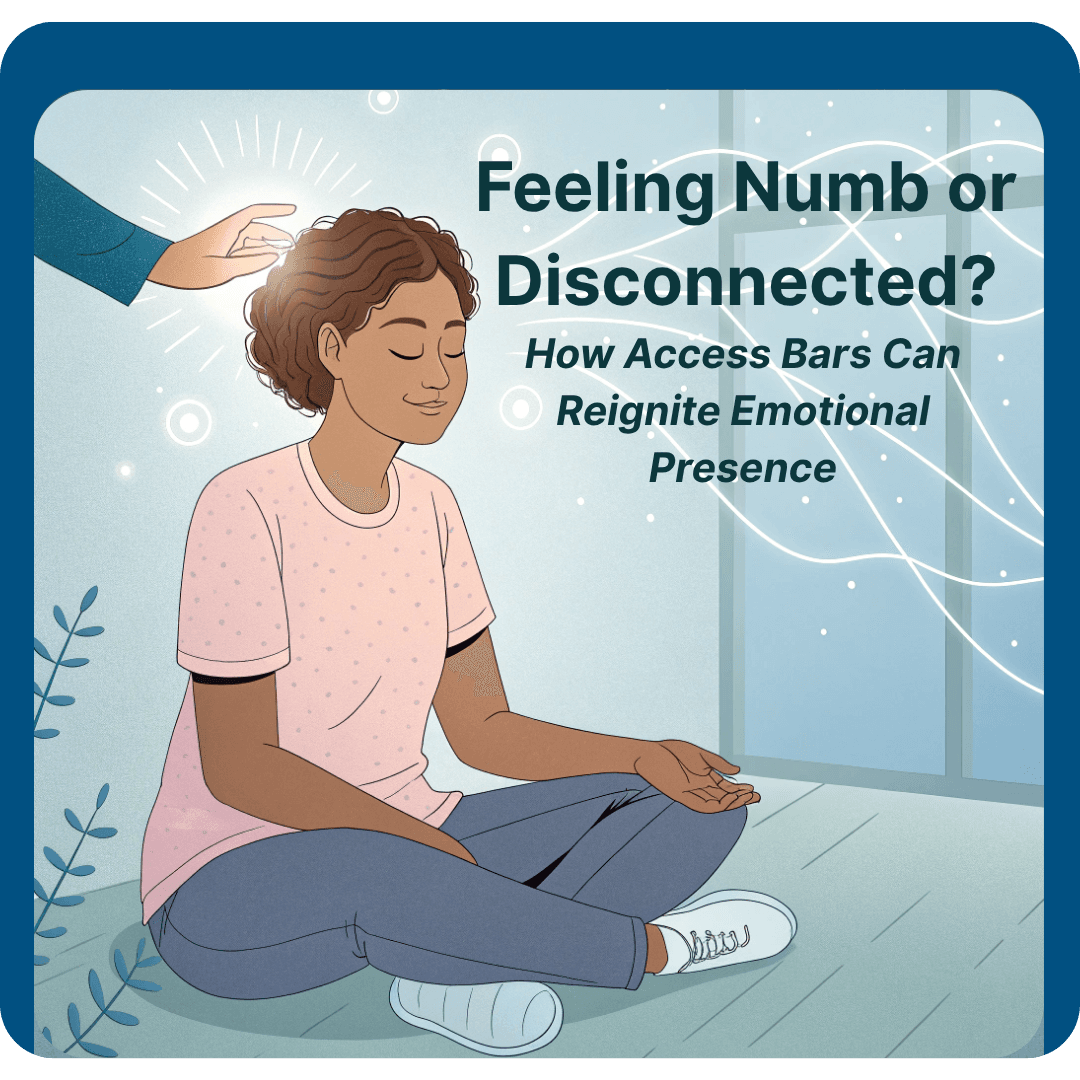Feeling Numb or Disconnected? How Access Bars Can Reignite Emotional Presence
Table of Contents
Restore Emotional Balance with Access Bars Therapy
Emotional Presence
“I don’t feel anything anymore.”
“I smile, but I’m not really happy.”
“I’m just… getting through the day.”
If any of these sound like something you’ve whispered to yourself lately, you’re not alone. Feeling numb or emotionally disconnected has become an all-too-common experience, especially among women juggling careers, relationships, and expectations.
We’re constantly told to “keep going,” “be strong,” or “push through,” but what if that’s exactly what’s made us numb? What if in the race to do it all, we’ve stopped feeling at all?
Let me share a story with you. It’s about a woman named Rhea. Maybe, just maybe, it’s also about you.
Rhea’s Story: The Day She Realized Something Was Missing
Rhea was what most would call “sorted.”
- A successful 32-year-old marketing executive.
- Married.
- Gym before work. Meal prepped on Sundays.
- Always on time. Always said yes.
But underneath the surface, she was emotionally running on empty.
“I wasn’t sad,” she told me. “I wasn’t angry. I wasn’t anything. I just didn’t feel much at all.”
She noticed it when her best friend shared some exciting news—Rhea smiled, said all the right things, but felt… nothing.
She noticed it when her dog passed away—she cried once, then went back to work like it never happened.
She noticed it most when she was alone—when the silence felt heavy and hollow.
Why Do So Many of Us Feel This Way?
Rhea isn’t alone. Emotional numbness is something I hear from women all the time. You might not even know you’re feeling numb because you’re still functioning—doing the job, attending the dinners, checking off the list.
But here’s the truth: Functioning isn’t the same as feeling.
Somewhere along the way, many of us learned to disconnect just to survive.
- We’ve suppressed pain so we could be “strong.”
- We’ve avoided emotions to avoid breakdowns.
- We’ve stayed busy because slowing down feels scary.
But the cost?
You lose the good feelings, too.
The joy. The inspiration. The spark.
Enter Access Bars: A Gentle Path Back to You
When Rhea came to me, she didn’t want therapy.
She didn’t want to “unpack childhood trauma.”
She just wanted to feel something again.
That’s when I introduced her to Access Bars.
“Wait… you just touched my head?” she asked skeptically.
“Yes,” I smiled. “And you just… receive.”
Access Bars is a gentle, hands-on energy process where 32 points on the head—called “Bars”—are lightly touched. These points store the electromagnetic charge of all the thoughts, emotions, and beliefs you’ve collected over time.
Imagine your mind as a cluttered browser with hundreds of tabs open. Access Bars gently closes those tabs—without needing to dig into every single one.
It doesn’t force change.
It doesn’t need you to explain your past.
It just creates space for you to reconnect… with you.
What Happens in an Access Bars Session?
Rhea’s first session was quiet.
She lay down, eyes closed, while I activated the Bars on her head.
Within minutes, her breath deepened.
Her jaw unclenched.
Her shoulders dropped.
“I didn’t know how tense I was until I started to relax,” she later said.
By the end of the session, tears slid down her cheeks. Not from sadness. Not from pain. But from relief.
“I felt real again,” she whispered. “Like I was home.”
The Science (and the Soul) Behind It
Access Bars may sound “woo-woo” at first glance, but neuroscience supports what practitioners have long observed.
A study conducted by Dr. Terrie Hope (published in the Journal of Energy Psychology) found that Access Bars significantly reduces anxiety, depression, and stress. Brain scans before and after a session showed changes in brainwave activity associated with deep relaxation.
It’s like energetic defragmentation—clearing the subconscious noise so your true self can breathe again.
How Access Bars Helps Reignite Emotional Presence
Releases Emotional Suppression
The Bars allow old, stagnant energy tied to past pain, disappointment, or fear to be released, without reliving it. You don’t have to “dig deep” to heal. You simply have to receive.
Creates Inner Stillness
Many women live in a constant mental overdrive. Access Bars invites you into deep stillness—a place where your emotions can finally catch up to your body.
Enhances Awareness and Intuition
After a few sessions, Rhea shared:
“I started noticing the little things again—the way sunlight hits my window, the joy in a song. I felt present.”
This presence is where connection is born—first to yourself, then to others.
Restores the Nervous System
Access Bars gently signal safety to the nervous system. When your body feels safe, emotions don’t need to be suppressed. They can flow freely, healthily.
How Access Bars Helps Reignite Emotional Presence
🔹 You feel emotionally flat or unmotivated
🔹 You’ve “lost interest” in things you used to love
🔹 You’re constantly overthinking or anxious
🔹 You crave rest but struggle to relax
🔹 You can’t remember the last time you felt excited
If this feels like you, Access Bars might be the reset button you didn’t know you needed.
Back to Rhea — The Shift That Changed Everything
After three sessions, Rhea wasn’t just “cured.” But she was connected.
She laughed more. Cried when something moved her. Took longer walks. She started painting again.
Not because she had to. But because she wanted to.
“I feel like I came back to life,” she said.
“And all I did was lie down and let go.”
Your Next Step: Come Home to You
If you’re reading this and nodding quietly, I want you to know:
You don’t have to stay numb. You don’t have to figure it all out.
Sometimes, healing begins by simply allowing yourself to receive.
📍 At The Healing Room, I offer Access Bars sessions designed especially for women like you, who are tired of surviving and ready to start feeling again.
Ready to reconnect with yourself?
Book your Access Bars session today and take the first step back to emotional presence.
Success doesn’t mean you’re okay. Being busy doesn’t mean you’re fulfilled.
And numbness? It’s not weakness. It’s a sign that you’re ready to come back to life.
You deserve to feel again. You deserve to heal gently.
You deserve to come home to yourself—with softness, with presence, with ease.
And Access Bars… is a beautiful place to begin.
——
Compiled and Written by
Sonali Mittra
FAQs
Yes. Even if you feel emotionally numb, the Bars can release stored emotions. Many people sense small shifts—lightness, clarity, relief—after one session.
No. You don’t need to share or analyze your past. You simply lie down and receive. The process works energetically to release what you are carrying without reliving it.
It depends. Some feel a change after one session; others need a few. Little moments—like noticing beauty, laughter, or ease—often return gradually.
Absolutely. Many who seem fine on the outside feel a kind of numbness inside. Bars helps peel back protective layers so you can reconnect safely with your emotions.
Yes. Studies (like in the Journal of Energy Psychology) show that Access Bars can reduce anxiety, depression, and stress, and change brainwave patterns toward relaxation.
Possibly. Some cry, some laugh, others just feel calm or sleepy. Emotional release is natural and part of the shift.
Definitely. Belief isn’t required. Bars works on the energetic level. Many skeptics also report feeling shifts in mood or clarity.
It varies by person. Some start with weekly sessions during a rough patch; others do biweekly or monthly for maintenance. Listen to your feelings to guide frequency.
No serious side effects. Some people feel tired, emotional release, or deeper rest after a session. It’s gentle, but good to rest, drink water, and take it easy afterwards.
You might notice more emotional presence, noticing small joys again, feeling less overwhelmed, more ease in daily life, and better clarity in thoughts and decisions.




This was such a clear and heart-centered explanation of how Access Bars helps with emotional release. I’ve been considering it for a while, and now I feel more confident to give it a try!
I’ve been curious about Access Bars for a while, and reading your post really resonated with me. After my first session, I noticed a subtle shift — emotions that I didn’t even realize were stuck started to release, and there was this calming clarity I hadn’t felt in months. It’s amazing how something so gentle can make such a noticeable difference in daily life. Your explanation made it feel approachable and inspiring — can’t wait to continue exploring this practice!